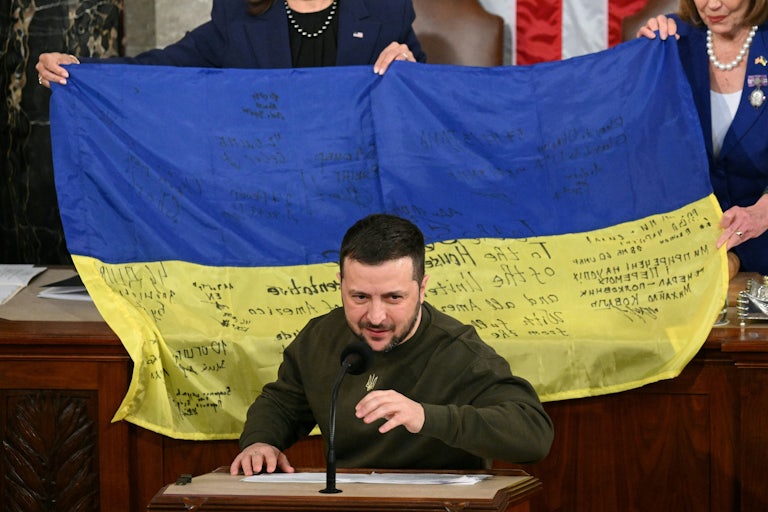Three Key Provisions in the Huge Spending Bill the Senate Just Passed
The package is more than 4,000 pages long. Here are a few highlights.

The Senate passed a massive spending bill on Thursday, funding the government through September 2023. The $1.7 trillion package, which passed 68–29, must now pass the House of Representatives and then be signed into law by President Joe Biden. Congress is under a major time crunch to get it done, with the 2022 budget expiring Friday and the winter holiday weekend looming.
Although the bill left out several popular provisions, here are three major measures it does include.
1. Aid for Ukraine
The bill includes $45 billion in humanitarian, economic, and security aid for Ukraine as it fends off Russia’s nearly yearlong invasion. The funds will help arm and equip Ukrainian forces, as well as support an increase of U.S. troops in Eastern Europe and the defense capabilities of NATO allies. The money will also help replenish Defense Department weapons stockpiles, which are being used to supply Kyiv’s military.
Ukrainian President Volodymyr Zelenskiy visited Washington on Wednesday, his first trip overseas since the war began, and called Congress to pass the aid provision for his country. He urged lawmakers to see the funds not as “charity” but as “an investment in … global security and democracy.”
The provision also comes a day after Biden formally announced an additional $1.8 billion in aid to Ukraine, including a Patriot missile system.
2. Increased protections for pregnant workers
The package includes two bills aimed at increasing protections for pregnant and nursing people in the workplace, the Pregnant Workers Fairness Act and the PUMP Act.
The Pregnant Workers Fairness Act would require employers to provide accommodations for pregnant workers, such as more frequent bathroom breaks, the option to sit down during shifts, and permission to carry a water bottle around.
The PUMP Act requires workers be given the extra break time necessary to pump breast milk.
Advocates hailed the two measures, having argued that thousands of people lose their jobs each year because of the lack of accommodations for pregnant and breastfeeding employees.
3. Safeguards against another January 6
The package includes two provisions that will help prevent another attack like the insurrection on January 6, 2021.
The Electoral Count Reform and Presidential Transition Improvement Act reaffirms that the vice president has a purely ceremonial role in certifying the Electoral College votes and cannot overturn the election results, as President Trump urged Vice President Pence to do.
The bill, which has bipartisan support in both chambers, also raises the minimum number of lawmakers required for an objection to the results to move forward.
The second provision increases U.S. attorneys’ budget by $212.1 million for a total of $2.63 billion in 2023. The House Appropriations Committee explained the funds were necessary “to further support prosecutions related to the Jan. 6 attack on the Capitol and domestic terrorism cases.”
The FBI has arrested about 900 people connected to the insurrection but could charge a total of about 3,000 people when all is said and done.








